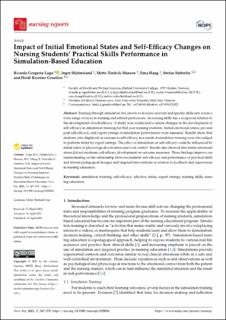| dc.contributor.author | Lugo, Ricardo Gregorio | |
| dc.contributor.author | Hjelmeland, Inger | |
| dc.contributor.author | Hansen, Mette Tindvik | |
| dc.contributor.author | Haug, Erna | |
| dc.contributor.author | Sütterlin, Stefan | |
| dc.contributor.author | Grønlien, Heidi Kristine | |
| dc.date.accessioned | 2021-09-17T11:16:22Z | |
| dc.date.available | 2021-09-17T11:16:22Z | |
| dc.date.created | 2021-04-13T09:15:30Z | |
| dc.date.issued | 2021-04-21 | |
| dc.identifier.issn | 2039-4403 | |
| dc.identifier.uri | https://hdl.handle.net/11250/2778908 | |
| dc.description.abstract | Training through simulation has shown to increase relevant and specific skills sets across a wide range of areas in nursing and related professions. Increasing skills has a reciprocal relation to the development of self-efficacy. A study was conducted to assess changes in the development of self-efficacy in simulation training for 2nd year nursing students. Initial emotional states, pre and post self-efficacy, and expert ratings of simulation performance were assessed. Results show that students who displayed an increase in self-efficacy as a result of simulation training were also judged to perform better by expert ratings. The effect of simulation on self-efficacy could be influenced by initial states of physiological activation and over control. Results also showed that initial emotional states did not moderate self-efficacy development on outcome measures. These findings improve our understanding on the relationship between students’ self-efficacy and performance of practical skills and inform pedagogical designs and targeted interventions in relation to feedback and supervision in nursing education. | en_US |
| dc.language.iso | eng | en_US |
| dc.publisher | MDPI | en_US |
| dc.relation.ispartofseries | Nursing Reports;Volume 11, Issue 2 | |
| dc.rights | Navngivelse 4.0 Internasjonal | * |
| dc.rights.uri | http://creativecommons.org/licenses/by/4.0/deed.no | * |
| dc.subject | Simulation training | en_US |
| dc.subject | Affective states | en_US |
| dc.subject | Self-efficacy | en_US |
| dc.subject | Expert ratings | en_US |
| dc.subject | Nursing skills | en_US |
| dc.subject | Nursing education | en_US |
| dc.title | Impact of initial emotional states and self-efficacy changes on nursing students’ practical skills performance in simulation-based education | en_US |
| dc.type | Peer reviewed | en_US |
| dc.type | Journal article | en_US |
| dc.description.version | publishedVersion | en_US |
| dc.rights.holder | © 2021 by the authors. | en_US |
| dc.source.articlenumber | 11 | en_US |
| cristin.ispublished | true | |
| cristin.fulltext | postprint | |
| cristin.qualitycode | 1 | |
| dc.identifier.doi | https://doi.org/10.3390/nursrep11020026 | |
| dc.identifier.cristin | 1903683 | |
| dc.source.journal | Nursing Reports | en_US |
| dc.source.volume | 11 | en_US |
| dc.source.issue | 2 | en_US |
| dc.source.pagenumber | 267-278 | en_US |

